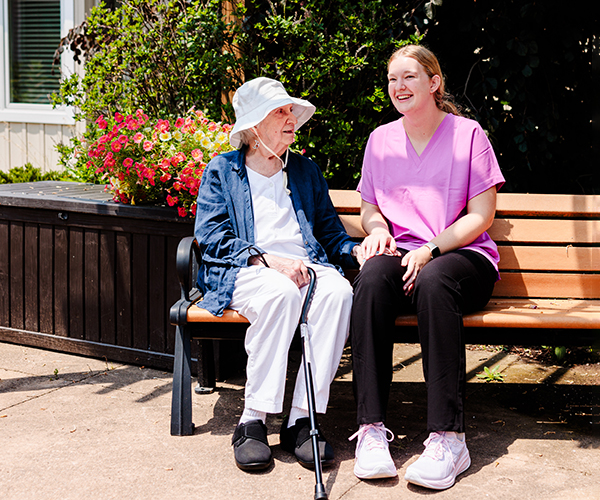Many people with nurturing personalities consider careers in either nursing or teaching. Rosa Johnson found her calling by combining the two professions.
“It’s been the joy of my life,” says the 61-year-old Ursuline College clinical nursing instructor. “When you see a light bulb go on in a student’s mind, you know you’ve made a difference in their lives.”
Nursing professionals hope more will follow Johnson’s lead. Nursing schools would like to see more applicants. However, there aren’t enough instructors to teach those who do apply. As a result, many qualified students — potential nurses — are being denied admission and forced to select other careers. This problem contributes to the nursing shortage.
Experts, including Johnson, attribute the shortage to simple economics: Clinical nursing traditionally pays better than teaching. Further, college-level teaching often requires an advanced degree along with demonstrable practical experience. Nurses with these qualifications are aggressively recruited — and more generously compensated — by hospitals.
But for Johnson, who has been a nurse for 41 years, it has never been about earning power. As a young woman, she considered becoming either an English teacher or a nurse, because both paths would allow her to help others. She chose the health care route, deciding to enroll in a licensed practical nursing program. At her first job, the head nurse there became her role model. “I wanted to pattern myself after her, because she was knowledgeable and learned,” she says.
Johnson went on to earn her associate’s degree in science and nursing. Over the years, she has added bachelor’s degrees in communications and nursing, a master’s degree in management and certifications in oncology and gerontology.
But for all her studies, Johnson still hadn’t considered combining her nursing background with teaching. She spent 30 years at Huron Hospital, serving in various capacities from patient care coordinator to assistant nurse manager for oncology and medical-surgical units. She then moved to Hillcrest Hospital for a 10-year stint as patient care coordinator for oncology.
Only after spending years mentoring nursing students did she realize how much she enjoyed the teaching aspect of her work. So in 2005, she become a clinical instructor with Ursuline College, the same institution from which she earned her own bachelor’s degree in nursing.
Johnson loves her students, but she won’t coddle them. “A staff member asked if one of my students wanted to put in a catheter, and one student took off running,” she recalls. “I said, ‘That one over there does.’ I asked the student, ‘Why would you run?’ and she said, ‘I’ve never done that before.’ Well, she got it in on the first try.”
That student is now a successful registered nurse, Johnson proudly reports.
Although this veteran caregiver enjoys bedside nursing, she says she feels blessed by her opportunity to educate.
“When God gives you a gift, it’s for you to pass along to others — especially if you have a gift to teach,” she says. “I wake up every day knowing this is what I love to do.”
“It’s been the joy of my life,” says the 61-year-old Ursuline College clinical nursing instructor. “When you see a light bulb go on in a student’s mind, you know you’ve made a difference in their lives.”
Nursing professionals hope more will follow Johnson’s lead. Nursing schools would like to see more applicants. However, there aren’t enough instructors to teach those who do apply. As a result, many qualified students — potential nurses — are being denied admission and forced to select other careers. This problem contributes to the nursing shortage.
Experts, including Johnson, attribute the shortage to simple economics: Clinical nursing traditionally pays better than teaching. Further, college-level teaching often requires an advanced degree along with demonstrable practical experience. Nurses with these qualifications are aggressively recruited — and more generously compensated — by hospitals.
But for Johnson, who has been a nurse for 41 years, it has never been about earning power. As a young woman, she considered becoming either an English teacher or a nurse, because both paths would allow her to help others. She chose the health care route, deciding to enroll in a licensed practical nursing program. At her first job, the head nurse there became her role model. “I wanted to pattern myself after her, because she was knowledgeable and learned,” she says.
Johnson went on to earn her associate’s degree in science and nursing. Over the years, she has added bachelor’s degrees in communications and nursing, a master’s degree in management and certifications in oncology and gerontology.
But for all her studies, Johnson still hadn’t considered combining her nursing background with teaching. She spent 30 years at Huron Hospital, serving in various capacities from patient care coordinator to assistant nurse manager for oncology and medical-surgical units. She then moved to Hillcrest Hospital for a 10-year stint as patient care coordinator for oncology.
Only after spending years mentoring nursing students did she realize how much she enjoyed the teaching aspect of her work. So in 2005, she become a clinical instructor with Ursuline College, the same institution from which she earned her own bachelor’s degree in nursing.
Johnson loves her students, but she won’t coddle them. “A staff member asked if one of my students wanted to put in a catheter, and one student took off running,” she recalls. “I said, ‘That one over there does.’ I asked the student, ‘Why would you run?’ and she said, ‘I’ve never done that before.’ Well, she got it in on the first try.”
That student is now a successful registered nurse, Johnson proudly reports.
Although this veteran caregiver enjoys bedside nursing, she says she feels blessed by her opportunity to educate.
“When God gives you a gift, it’s for you to pass along to others — especially if you have a gift to teach,” she says. “I wake up every day knowing this is what I love to do.”



